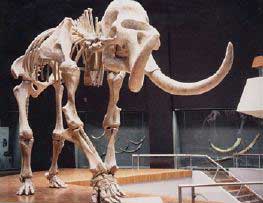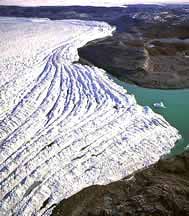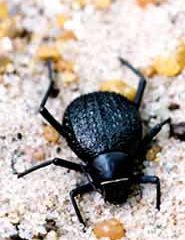
Scientists can coax tiny metal particles to self-assemble into microscopic wires that conduct electricity and repair themselves, new research reveals. Kevin D. Hermanson of the University of Delaware and his colleagues, who published their finding in the current issue of Science, suggest that such nanowires may prove useful for wet electronic and bioelectric circuits.
The researchers placed particles of gold ranging in diameter from 15 to 30 nanometers in a fluid suspension within a thin ch

Water trapped for millions of years gives a glimpse of oceans’ turbulent past.
Drops of sea water entombed within salt crystals millions of years ago are giving researchers a glimpse of ancient oceans. The water, trapped during evaporation, reveals that the seas have seen large chemical changes during their history.
“The consensus had been that sea-water chemistry hadn’t changed that much over the past 600 million years,” says geochemist Juske Horita of Oak Ridge National La

Some galaxies may have torus envy, if a new study is any indication. The most sensitive imaging yet of nearby galaxy M87’s core reveals that the black hole residing there has either a nonexistent or much fainter ring of dust around it compared with its peers. Scientists had thought that these rings were key features of such highly energetic galaxies. The puzzling finding appears today in the Astrophysical Journal Letters .
The current model of active galaxies such as M87 posits that

Examine any depiction of Ice Age life and you’re likely to find at least one—a woolly mammoth, that is. But popular appeal notwithstanding, the evolutionary history of this prehistoric beast has proved somewhat difficult to pin down. To that end, findings published today in the journal Science provide some much needed insight.
Working from an extensive Eurasian fossil record going back some 2.6 million years, Adrian Lister of University College London and Andrei V. Sher of the Russian Acad

Half a century of thinning ice leaves Greenland’s future looking wet.
There is new evidence that the Greenland ice pack is in retreat. The finding may be a foretaste of still more rapid melting, and in turn, rising sea levels.
The ice sheet over northwest Greenland has thinned by 10-15 cm a year over the past 40 years, two scientists calculate 1 . The trend indicates “a significant long-term thinning”, says one, Niels Reeh, of the Technical University of

Humans learn water-gathering trick from bumpy beetle.
A desert beetle turns fog into drinking water with its wings, new research reveals. Materials mimicking the insect could help humans survive harsh environments.
Southwest Africa’s Namib Desert is one of the hottest and driest places on Earth. There is no rain, but on about six mornings a month a fog blows in off the Atlantic and across the land at gale force.
The beetle Stenocara traps this fleeting resour

– new calculation confirms standard model of particle physics. Contribution of hadronic vacuum polarization determined with unprecedented accuracy. The magnetic moment of the muon is an important precision parameter for…
Technique may prevent formation of unwanted waves that siphon off needed energy. Heating plasma to the ultra-high temperatures needed for fusion reactions requires more than turning the dial on a…

An international team of astronomers, led by researchers from the Astronomical Observatory of the University of Warsaw, have identified a new class of cosmic X-ray sources. The findings have been…

Antibody that Neutralizes Inhibitory Factors Involved in Nerve Regeneration Leads to Enhanced Motor Function after Acute Spinal Cord Injury. Researchers at 13 clinics in Germany, Switzerland, the Czech Republic and…

How the body’s natural killer cells could fight leukemia. Every year, some 13,000 people in Germany are diagnosed with leukemia. Despite intensive chemotherapy, around one in two of them die….

… eco-friendly reactor converts air and water into ammonia. Producing enough ammonia to feed the world comes with a large carbon footprint;. process described in new UB-led study could help…

How simulations help manufacturing of modern displays. Modern materials must be recyclable and sustainable. Consumer electronics is no exception, with organic light-emitting diodes (OLEDs) taking over modern televisions and portable…

“Neurons that fire together, wire together” describes the neural plasticity seen in human brains, but neurons grown in a dish don’t seem to follow these rules. Neurons that are cultured…

The quest for sustainable energy solutions has been a major focus of scientific research for decades. Solar energy, a clean and renewable source, has emerged as a promising alternative to…

With a processing speed a billion times faster than nature, chip-based laser neuron could help advance AI tasks such as pattern recognition and sequence prediction. Researchers have developed a laser-based…

New technology could remotely identify various types of plastics, offering a valuable tool for future monitoring and analysis of oceanic plastic pollution. Researchers have developed a new hyperspectral Raman imaging…

Artificial Intelligence (AI) has established a strong presence across industries, large and small. The “VoBaKI” research project has empowered small and medium-sized enterprises (SMEs) with an innovative tool to independently…